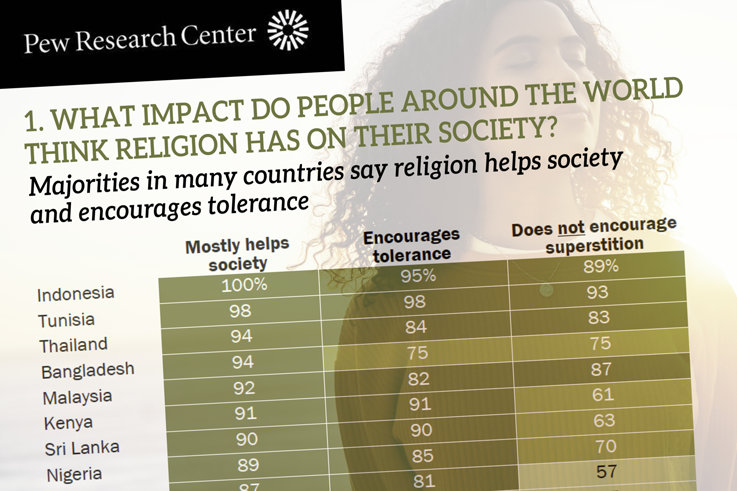
-
HOME
-
WHAT IS STANDOur Mission Our Values Our Help Contact
-
WHAT WE FIGHT FORReligious Freedom Religious Literacy Equality & Human Rights Inclusion & Respect Free Speech Responsible Journalism Corporate Accountability
-
RESOURCESExpert Studies Landmark Decisions White Papers FAQs David Miscavige Religious Freedom Resource Center Freedom of Religion & Human Rights Topic Index Priest-Penitent Privilege Islamophobia
-
HATE MONITORBiased Media Propagandists Hatemongers False Experts Hate Monitor Blog
-
NEWSROOMNews Media Watch Videos Blog
-
TAKE ACTIONCombat Hate & Discrimination Champion Freedom of Religion Demand Accountability
Majority Say Religion Helps Society, According to New Pew Survey
A new study released on January 28 reveals that most people believe religion helps society and fosters tolerance.

The Pew Research Center survey asked nearly 13,000 adults in 36 countries about the impact religion has on their society: Does it help? Does it foster superstitious thinking? Does it encourage tolerance?
Taken nation by nation and demographic by demographic, the survey shows that religion is seen as a force for good by people in middle-income countries more so than higher-income countries. For example, in Bangladesh 94% feel that religion “mostly helps society” and 75% believe it “encourages tolerance.” By contrast, the UK tallied just 46% and 41% on those same points.
Religion is also seen more positively by people who identify as members of a faith community and who pray daily.
Despite living in a world mostly hostile to religion, overwhelming majorities still profess its benefits.
In addition to geographical analyses, the survey tabulated results by individual religious communities. Muslims in all countries surveyed, for example—whether or not they are in the majority—overwhelmingly say religion helps society and encourages tolerance. In fact, in all nations surveyed, Muslims take the lead among faith communities in favorable views of religion’s impact on society—at 83% in the U.S., 95% in Indonesia and 99% in Tunisia as examples—the only exception being Sri Lanka, which still scored a relatively high 75%.
A majority of Buddhists across Southeast Asia believe in religion’s positive impact by large majorities, as do Hindus in Bangladesh and India, and Christians in Sub-Saharan African, Latin American and Asia-Pacific nations.
Possibly as a reaction to the current unrest in the Middle East, Israel, the nation with the largest Jewish population, finds Muslim Israelis more likely than Jewish Israelis to believe that religion encourages tolerance, at 88% and 66%, respectively.
In the United States, the nation with the second largest Jewish demographic, the differences are even more striking, with the Jewish community’s confidence in religion’s role in encouraging tolerance at 52%, compared to Muslims at 83% and Christians at 77%. The recent alarming spike in antisemitism could explain the middling confidence on the part of the Jewish demographic, but Pew has no comment on that.
Indeed, overall, Pew offers no reason for its findings—just the raw figures. But a Pew study from last year gives some perspective: Governments harassed religious groups in 183 countries and territories out of 198 tracked, the highest level recorded since tracking began in 2007, and over 80% of the global population lives in an environment where it could be dangerous to openly espouse their faith.
Yet, despite living in a world mostly hostile to religion, overwhelming majorities still profess its benefits.
The survey results add to the mountain of evidence that religion is the beating heart of a people and, as such, must be protected.
As an organization working to build a world that is safe and inclusive for members of every faith, STAND supports the right of people everywhere to believe as they choose and practice their faith freely.






